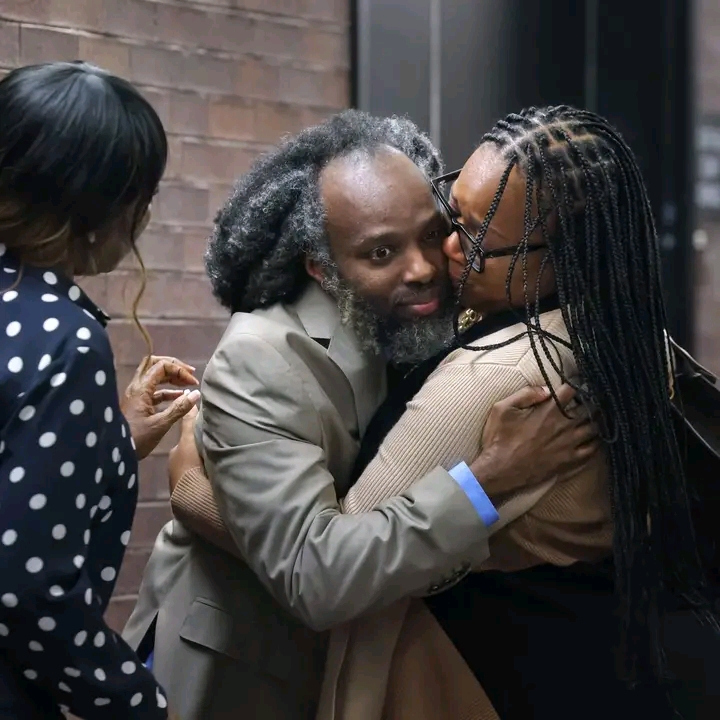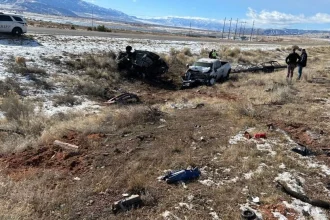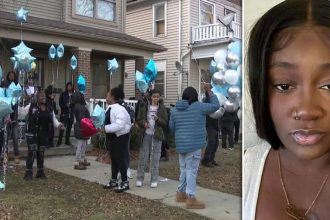Greensboro, North Carolina – Benjamin Cole Freed After 27 Years Behind Bars for a Crime He Maintains He Did Not Commit
Greensboro, NC – Benjamin Cole walked out of a North Carolina prison a free man on the morning of June 25, 2025, after spending nearly three decades incarcerated for a crime he has consistently claimed he did not commit. Now 47 years old, Cole was convicted in 1998 of the murder of Calvin Jenkins in Greensboro — a case marred by incomplete investigations, questionable witness accounts, and missing exculpatory evidence that has finally come to light.
His release marks the end of a long and painful chapter not only in his own life, but also in the life of his family — most notably his younger sister, who was only a child when Cole was first arrested. Her unwavering belief in his innocence would one day spark a legal fight that led to the truth.
A Childhood Torn Apart
In 1998, Benjamin Cole was arrested and later convicted of first-degree murder in the death of Calvin Jenkins, a young man whose body was discovered in a Greensboro neighborhood following a violent confrontation. Prosecutors at the time painted Cole as the primary suspect, relying heavily on circumstantial testimony from individuals whose credibility has since come under serious scrutiny.
At just nine years old, Cole’s younger sister watched helplessly as her brother was taken away, their family shattered almost overnight. But that moment left a lasting impression on her. Even at that age, she said, something didn’t feel right.
“He kept telling us he was in Ohio. He never stopped saying it,” she later shared in a televised interview. “No one wanted to listen. No one wanted to believe him. But I did.”
That belief became the foundation of a lifelong pursuit of justice.
A Sister’s Promise Turns Into a Legal Mission
Years later, the girl who had once sat silently in the courtroom returned as an attorney determined to make things right. After graduating from law school, she joined the fight to reopen her brother’s case. Her personal connection to the injustice made her a powerful advocate, but she knew it would take more than belief to challenge a decades-old conviction.
In 2018, she partnered with Duke University’s Wrongful Convictions Clinic, a program known for its meticulous case reviews and willingness to take on complex appeals. Law students, professors, and legal experts began pouring through court transcripts, police files, and original evidence from the trial.
What they discovered was deeply troubling.
Hidden Evidence and Flawed Testimony
Key among the clinic’s findings were previously undisclosed police documents and witness statements that directly contradicted the prosecution’s version of events. These included notes suggesting alternate suspects had been named early in the investigation and that alibi witnesses who could place Cole in Ohio on the night of the crime were never interviewed.
No physical evidence ever tied Cole to the scene — no DNA, no fingerprints, and no weapon. Instead, the conviction had relied largely on testimony from two witnesses, both of whom later admitted under oath that they had lied to police during the initial investigation.
Court documents revealed that these witnesses had faced unrelated criminal charges at the time, raising serious concerns about whether their testimony had been coerced or incentivized.
“This was a textbook example of a wrongful conviction,” said one of the attorneys at Duke’s clinic. “When you have no forensic evidence, unreliable witness testimony, and suppressed documentation — that’s a failure of justice at every level.”
Legal Breakthrough and Alford Plea
On June 25, 2025, after years of legal battles, a judge in Guilford County Superior Court overturned Cole’s conviction. In a carefully negotiated agreement with the district attorney’s office, Cole entered what is known as an Alford plea — a legal mechanism that allows a defendant to maintain their innocence while acknowledging that the state had enough evidence to pursue a conviction. The plea cleared the way for his immediate release under a time-served agreement.
Though not a full exoneration in the legal sense, the plea effectively ends Cole’s incarceration and offers him the freedom he has long awaited.
In his first public statement since the ruling, Cole expressed gratitude for the legal team, his family, and all those who never gave up on his case. “I didn’t think I’d ever see the outside again,” he said. “There were days I felt invisible — like the truth didn’t matter. But it did. It always mattered.”
Life After Prison: Adjusting to a New World
Now free, Benjamin Cole is beginning the slow and often overwhelming process of rebuilding his life. In the 27 years since his conviction, the world outside has changed in ways he is still trying to understand.
Simple tasks like using a smartphone, paying for groceries with digital wallets, or navigating the internet require guidance. Cole is working closely with a reentry program in Greensboro that assists wrongfully convicted individuals in adjusting to modern life — providing help with housing, employment, technology training, and mental health services.
“It’s strange to feel like a grown man but still need to learn how to do basic things all over again,” he said. “But I’m grateful for every lesson, every chance.”
He’s also reconnecting with family — some of whom were children when he went away and are now raising children of their own. The emotional reunions have been filled with both joy and sorrow, as decades lost cannot be reclaimed but relationships can begin anew.
A Family’s Long-Awaited Relief
For his sister, the victory is deeply personal but not without complexity.
“I’m relieved. I’m proud. But I’m also angry it took this long,” she said. “He lost his youth. He lost opportunities. He missed birthdays, weddings, funerals. There’s no way to give him those years back.”
She continues to work with innocence organizations and has become a vocal advocate for criminal justice reform, especially in areas related to evidence suppression, witness credibility, and post-conviction review processes. Her hope is that no other family has to endure what hers did.
Broader Implications for Justice Reform in North Carolina
Benjamin Cole’s release raises significant questions about the reliability of past convictions in North Carolina and across the country. Advocates argue that his case is not an outlier, but rather part of a systemic issue where inadequate defense, overzealous prosecution, and flawed investigations can lead to life-altering outcomes for the innocent.
In recent years, North Carolina has taken steps to address wrongful convictions, including expanding access to innocence inquiries and supporting university-led legal clinics. However, critics say more needs to be done — including holding officials accountable when misconduct is uncovered and allocating funding for post-release compensation.
Under state law, Cole may be eligible for compensation for wrongful incarceration, though the process is lengthy and involves additional legal filings. If approved, he could receive up to $750,000, depending on the final classification of his release.
For now, Cole is focusing on healing — physically, emotionally, and mentally.
“I’m not bitter. I’m tired, but I’m not bitter,” he said. “Every day out here is a gift, and I’m going to make the most of it.”
Moving Forward: Hope After Hardship
Benjamin Cole’s journey is far from over, but the chapter that held him behind prison walls has finally closed. With the support of his family, legal team, and a community that is beginning to understand the depth of his ordeal, he is laying the foundation for a life reimagined.
He is considering working with youth programs to speak about resilience, justice, and hope. He also hopes to one day write a book about his experience — not just to share his truth, but to give strength to others still trapped by injustice.
His story serves as a sobering reminder of the fallibility of the justice system, and the incredible strength it takes to overcome it.




